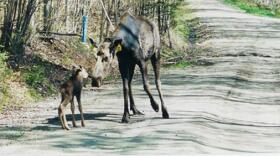The Annual Moose Hunt Lottery may become even more exclusive. New Hampshire Fish and Game is proposing a plan to give out only 51 permits this year, and that’s down from 71 permits issued last year. It’s the lowest it’s been since the system started in 1988.
NHPR’s Peter Biello spoke with Kristine Rines about the proposal and the state’s moose population. Rines is the Moose Program Leader at New Hampshire Fish and Game.
This transcript has been edited for clarity.
This is just a proposal at the moment, but it tells us a bit about the moose population in the state. Tell us why a reduction in moose hunting permits is important.
Each year we set the season, and the season parameters are kind of set to try and reach established goals, which are developed by the general public every 10 years. We manage moose in six regions across the state. Each region has a moose population goal and a cutoff threshold for hunting. And those were set in our 10 year planning process, which took place in 2015. So we strive to achieve those population goals by changing numbers of permits within each region.
Was this a planned reduction or is it in response to some new knowledge you’ve gathered about the state of the moose population in New Hampshire?
Every year we do monitor the population, and based on that monitoring some areas are stable, some areas saw a decline last year due to various factors. The Southwest actually declined to the hunting cutoff threshold. So in response to some of the declines, the permits have been reduced and southwestern region hunting permits have been suspended.
So overall it’s an attempt to let the moose population reestablish to a comfort that you’re comfortable with?
Hunting is not impacting this population. We are taking about one percent at this rate. I mean, cars are taking three percent. What is driving these populations are parasite loads. So we are allowing hunting because the populations continue to be close to the goals as set by the general public within each region, and we’ll continue to allow hunting probably at some different levels than this year based on how the population changes. But the hunt is not what is causing this population to change. It’s kind of like saying, “Gee, I’m dying of lung cancer. I have a hangnail. That’s what I’m going to focus on.” We can’t change the overall major impact to this moose population, which is our change in climate, which is in turn changing parasite loads. But we can try and change the hunt, and its impacts to the population overall is not going to be too impressive.
When it comes to regions of the state, where are moose most threatened and why? For example, is there a greater prevalence of the insects that do them harm in one part of the state as opposed to another, or are there more moose-car collision in one part of the state than another?
As far as the parasites go, it’s a very different story depending on what part of the state you’re in. Everything from the White Mountains north, the parasites that are of greatest concern are winter ticks. That is where we are doing our study is in the northern portion of the state, and that is where tick loads are causing moose to decline. South of there it is brainworm, which is influenced primarily by deer densities, which are increasing because our winters are shorter. And then overall as far as car collisions, we actually see some of the highest levels of car collisions through the White Mountains because there are very limited areas for the cars. They all funnel through on three major road systems, and those areas are also where moose tend to be. So that has the highest of vehicle collisions in the state.
And what are your concerns if this hunting limit isn’t dropped from 71 to 51?
Depending on whether it stays at 71 or 51, is that going to have a big major impact on the moose population itself? No, it probably won’t. But we have a responsibility to the general public to change in the face of changing conditions. So we are meeting that obligation by changing the number of permits in an attempt to reduce our own impact on the population.
This year may be a good year for moose, ironically enough, because we did have a drought last summer, which we are finding out now may reduce tick impact. We just have to see what happens. Regardless, we can’t look into the future and say, “Oh, things are going to get better.” We can only do what we do based on the actual information we have currently at hand.







